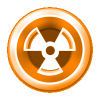SE50
SE50 or Spot Lights are used to cast a light in a single direction when the Polymer Renderer is used, it will not cast a light in other rendering modes and is unavailable in other ports. Unlike SE49, this type of light will cast shadows.
Setup
Mappers can create an SE50 by placing a SECTOREFFECTOR into their map and editing it's properties in 2D Mode.
| Property | Value | Notes |
|---|---|---|
| Lotag | 50 | Use ALT+T in 2D Mode to set the Lotag value. Set it to 50. |
| Hitag | Range | Use ALT+H in 2D Mode to set the Hitag value, this will determine the range or "conical radius" of the light (the size of the area it will light up). Unlike many other SE's, the Hitag does not have to be unique. |
| Angle | Direction | Use < and > in 2D Mode to set the Angle, this will determine the direction of the light. |
| Xvel | Red | Use F8 in 2D Mode to edit the sprite's properties.
The cursor and Return keys are used to navigate and select which property to edit in this mode, you can use the Esc key to exit this window. XVEL, YVEL and ZVEL represent the RGB (Red, Green and Blue) color levels for the light respectively. Set the XVEL to the desired amount of Red, the value must not be less than 0 and can be no more than 255. |
| Yvel | Green | The same as above except this sets the level of Green, the value must not be less than 0 and can be no more than 255. |
| Zvel | Blue | The same as above except this sets the level of Blue, the value must not be less than 0 and can be no more than 255. |
| Shade | Width | This sets the width of the light and ranges from -127 to 127. |
| Extra | Horizontal Angle | Used to point the light up or down, setting this to 100 will point the light forward but the default value points 37.9 degrees downwards. Positive values will angle upwards and negative values will point the light downwards. |
| Owner | Shadow | If you want to project the shadow of a masked texure, even when nothing is in front of the light, set this to the tile number of that texture. |
| Transparency | Priority | This controls the priority of the light and can be set using the T key in 3D Mode, a solid sprite is the highest priority, a 33% transparent light is a lower priority and a 66% transparent light is an even lower priority. Changing the transparency will not affect how the light appears. Lights with a low priority tend to do these first in low framerates: stop casting shadows, stop casting light in a sector if there are too many lights in the sector (see notes). |
| Center Bit | Negative | If you press C in 3D Mode, the light will remove light instead of casting it, can be used to make very dark spots in otherwise well lit areas, and other interesting light effects. |
| 1-Way | Toggle Shadows | If you press 1 in 3D Mode, the light will no longer cast shadows, this can be useful for increasing performance. |
You should also use PGUP and PGDN in 3D Mode to set the height of the light, leaving it too close to a floor will prevent the light from being cast very far.
Notes
- You can preview lights in Mapster32 by pressing '+X in 3D Mode, although you may have to use the console to enable Polymer with the command setrendermode 4.
- If a lot of lights are visible at the same time, performance begins to decrease quickly, keep an eye on the framerate counter. Aim for segmented maps that consist of smaller areas separated by ceiling doors, corridors or teleporters rather than huge outdoor areas.
- Also, if too many lights are visible in one sector, some will disappear. This can usually be fixed by splitting up the sector.
- Lights will often move with sectors, but it may cause flickering with certain effects. Sectors that the lights will move horizontally with (when the floor relativity bit is set) include: Two-Way trains, Subway Vehicles, SE1 and SE0 rotating sectors (lights can be made to move in a circular path, or can be made to spin which is great for spotlights). Lights will also move up and down with elevators.
- There is currently no way to turn the lights off in the game, you could use a door to cover them up, use a mod such as DukePlus or CONfetti or write your own CON Code.
- It might be useful to use the Edit Colors mode in Paint to help you get a grasp on how the RGB values work. It's also useful for finding values of a specific colour you have in mind.
